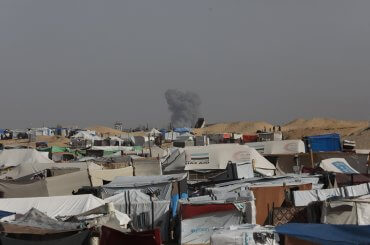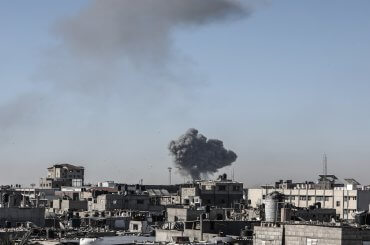
[Israeli President Shimon Peres] understands better than most the fundamental reality facing the State of Israel, that the status quo is unsustainable – now, that doesn’t mean that it can’t be sustained for a year or a decade, or two or three, but fundamentally, the status quo is unsustainable.
Two or three decades? Why is she saying such a thing?
But let’s not talk politics. I’d much rather try to convey to readers the most simple truth about the status quo: Every Palestinian I’ve met hates the occupation, and groans under it. Here are a few scenes from my first week:
–I go through the Qalandiya checkpoint, the dispiriting checkpoint between Ramallah and Jerusalem, famous for its galvanized-steel cattle chutes and gates. I am with a dozen other people lined up behind a turnstile that the guards control– they let a few people at a time into the inspection zone. A Palestinian woman is stopped at the front, and her son has been let through. He is about eight, and frightened. He can’t get his papers right and the soldier behind the glass keeps yelling at him and he keeps looking to his mother, who is locked in the turnstile. Men in line call out to let the woman through. At last she is let through to take care of her son.
I’m with three men who are permitted to go through next. They all look well off. The young man next to me has a barrel chest and gleaming hair, he looks like a Palestinian Travolta. He removes his belt and gets out his thick wallet and keys and coins, drops them on the conveyor, then walks through the metal detector and presents himself to the guards. I’ve been silent the whole time, but when we come out the other side and I ask where the bus is, he points the way and then fixes me with a fierce look, as if charging me to be a witness.
“You see– they treat us worse than animals.”
I say “How many Palestinians feel that way?”
“Every one of us.”
I wonder: Why are American network news shows not going through the Qalandiya checkpoint with hidden cameras to document this routine humiliation on a racial basis that is made possible by American support?
–I go on a hike through hills north of Ramallah with an outdoorsy/historical group of Palestinians and internationals. We come to a Crusader ruin on a hilltop. Inside the rambling old fortifications, there is a large fresh crater, about 10 feet deep– you can see its rim at the bottom of this picture. 
Just down the hill we run into a shepherd with a small herd of goats. He tells us that Israelis brought Jeeps and a backhoe to the site and dug it up, for what reason he has no idea. In an instant the emotion about the thieves changes, from one of dismay and contempt to one of rage and helplessness. Remember, we are deep inside the West Bank, on the land of Palestinian villages.
An hour later our walk takes us out near this Israeli control tower (below), surveying road and village.
Is it any wonder that, when we sit down to lunch in a glade, I discover that the 20 people on the walk have all taken care not to bring any food produced in Israel?
–Driving north through East Jerusalem, my friend stops at a traffic light where the road we are on, which serves the Palestinian neighborhoods of Sheikh Jarrah and Beit Hanina, intersects a big new east-west road that serves the settlers who live in Pisgat Ze’ev, a largely-Jewish settlement in occupied territory. We wait a while for the light to turn. He explains that the light is green for Palestinians for about 15 seconds. Then the red lasts for over a minute as the Israelis come and go.
I can’t believe him. We stop across the intersection and I count the seconds; he is right.
Al Jazeera’s Jacky Rowland did a piece about this discriminatory traffic light. Why not an American media outlet?
–I meet a Palestinian intellectual who is a West Bank resident but who lives with his wife and children in East Jerusalem. He needs a permit to live in East Jerusalem, and every six months he must renew the permit at what he calls the Ministry of Horrors–the Israeli Ministry of the Interior–providing proof that he is actually living in Jerusalem. Electric bills, rent payments, and even his children’s school certificates. Every six months, he must waste half a day sitting in waiting rooms at the Ministry of Horrors with a packet of papers, taking a number, going from room to room. You wouldn’t be able to tell this lean cheerful bespectacled man from an American columnist or professor; but this system makes him hate Israel, and it is easy to see why.
He tells me of other ways the red tape snarls Palestinian institutional life and says that there is a method to the madness: Israel is trying to convince highly-educated Palestinians, the natural leaders of this society, to leave this place for opportunities in the Gulf and in Europe. There is a brain drain, the smart ones leave; they say, Who needs this crap?
–I’ve heard so many tales of tyrannical bureaucracy that it is worth relating a couple more. A businessman who gives me a ride through Bethlehem in his BMW tells me that he was arrested at 15 for violating curfew coming home from school– and spent five months in jail. “I died every day in that prison.” Now Bethlehem is a walled city; and he has not been to Jerusalem in ten years. His children have never been there. His voice cracks as he tells me this.
On a bus, a friendly doctor tells me that both his brothers were arrested when they were young because they were drawn to resistance. Each spent only a few months in jail but the arrests were timed to interfere with the tawjihi, the Palestinian equivalent of the SATs, which determine college entrance. Each brother lost a year of his education.
A friend had to interrupt his studies overseas because though his family has lived in this land from time immemorial he is a ”permanent resident” of East Jerusalem who knows that if he is away too long, the Israelis will declare that his “center of life” is no longer Jerusalem, and revoke his status here. Thus are families divided and the educated dispersed.
I know I sound like an innocent: I’ve read about Palestinians prevented from seeing dying parents or getting their children to hospitals countless times. But it is something else to be here and meet Palestinians just like me, affluent, educated people, and to see their ambitions souring before their eyes, and their hopes for their children curdling.
And I don’t understand why this despotic bureaucracy is not the subject of a panel at J Street on actual Palestinian conditions, or is not a 60 Minutes piece, or on the nightly news.
–We all know about the weekly demonstrations in Bil’in, a village in the western West Bank, against Israel seizing village farmland so as to build out another settlement. The people of Bil’in have been demonstrating for five years. But think about it: this is a tiny village, on which this desperate situation has been thrust. Bil’in feels a lot like a hamlet in the hills of Vermont or upstate New York; and Dr. Rateb Aborahmah, a leader of the popular committee, points out to me what a large price his little village is paying for rising to the occasion. Two of its leading young men have been in jail for over a year without any indication of when they’ll be released, just for organizing demonstrations!
And the doctor’s own relative, Bassem Abu Rahme, was killed a year ago by a tear gas canister fired at his chest. At left is his grave, just over the cemetery wall from the main road through Bil’in.
–Demonstrations against the Israeli occupation are taking place in about 40 different sites around the West Bank and East Jerusalem and drawing global attention, from idealists. Many people are coming great distances out of solidarity with fellow human beings under occupation. Below is a photo of Julie Smit, an executive with a Luxembourg-based NGO who has come out to work on Palestinian issues.
She needed to see for herself. She went to the demonstration at Bil’in, and held that shirt across her face against the tear gas. She says the occupation is unique in international affairs today–because of the racial distinction between the parties, because of its longevity, and because of Israel’s claim to be a western-style democracy.
At the top of this post is a photo of a young man from Ireland at the same demonstration holding the Gandhi mask that the village’s creative popular committee handed out last Friday. Behind him in that photo are other youths from Ireland and Spain. And below are two more Irish men talking to two Americans. They’ve just been teargassed. The Irish youths are Labour Party and say that they are particularly sympathetic to Palestinians because of their history of colonization. One Irish youth said that the Hebrew signs on the walls of Palestinian businesses in occupied Hebron reminded him of the stuff he’s read about Nazis.
Europe is paying attention to this desperate arrangement. When will Americans stir– and shake off the endless status quo?
If you appreciate this on-the-ground reporting from Israel/Palestine – please donate to Mondoweiss today.





